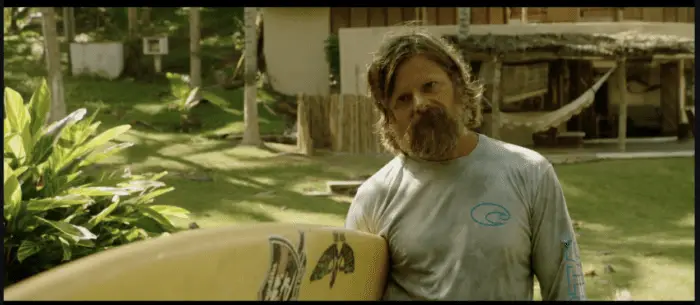Gringa gives us a film to appreciate the unheralded talent of Steve Zahn. For many movie fans, he’s a 90s/00s “That Guy.” He has built an extremely successful career playing dependable supporting comedic roles across a multitude of genres. From pulpy thrillers like Out of Sight or A Perfect Getaway, heartfelt favorites like You’ve Got Mail and That Thing You Do!, or in zany romps like Saving Silverman or Daddy Day Care, you’ve seen Steve more often than you realize, and he always brings a smile or two.
Call him a character actor if you must, but Steve Zahn is a master of portraying daftness. His characters always seem exasperated or a step or two behind the given moment. Some supporting actors annoyingly never leave that confused wavelength. They are ditzes for ditzes’ sake. Zahn is different. Zinger after zinger, he has the charisma to make daftness charming. When his sidekick characters catch up at the right time in the storyline, the commitment to having him around is almost always fulfilled.

Fast-forward from Steve Zahn’s hey-day. Add a quarter-century of mileage to his bread-and-butter manchild buddy type and do what too few filmmakers have done over the years: Give Steve Zahn a lead part. Take his usual brand of rootless screw-up and give it central focus and real anchors. Then, let Steve’s charm radiate fully. Gringa rewards this actor’s worth with a real chance.
Gringa opens in southern California with the teenager Margie (Shameless cast member Jess Gabor) navigating her way through life and high school looking almost like an abandoned squatter. In reality, her positivity-loving mother Marge (Judy Greer, another character actor as dependable as Zahn) is a down-on-her-luck real estate agent also squeaking by using open properties as places to stay. Margie rides the end of the bench of her school’s soccer team and is often jeered by her coach and teammates as being fat and slow, which she is far from.

Still, that social bullying spirals Margie towards the self-harm of over-eating and bulimia. Her already-precarious mental strength is destroyed further by the sudden death of Marge in a car accident. Picking through her mother’s belongings, she discovers a postcard and a poster giving her the likely whereabouts of the soccer star father Jackson Bickford (Zahn) who left them for Mexico when she was two. Avoiding the new guardianship of her Arizona grandparents, Marge scrounges up a passport and ventures precariously on her own across the border to find him.
The Jackson she meets is a bearded drunk living off the grid in the coastal village of Lo De Marcos. He makes ends meet by doing handyman jobs and coaching the lady’s soccer team with the local priest (Jorge A. Jimenez of Narcos). Margie arrives with staying forever in mind. For a tipsy hermit like Jackson, Margie being back in his life is like seeing a ghost and becomes a rattling reminder of long-forgotten responsibility. Prime flustered Steve Zahn sells this shock.

Gringa puts Jackson and Margie together with the plot point of Jackson giving Margie a trial month of living together. True to Zahn’s daft streak, Jackson is dumbstruck with what to do. Jess is free to explore the local scene (filmed stunningly in Riviera Nayarit and Baja California) while being enlisted to join Jackson’s soccer squad. She falls for a local boy (newcomer Nico Bracewell) who teaches her to surf, is guided by Jackson’s off-and-on love interest bar owner Elsa (Roselyn Sanchez of Without a Trace and Devious Minds), and finds a good group of girlfriends from her teammates, particularly Azusana (TV actress Valentina Buzzurro). All the while, Jackson rests on a you-do-you mentality that he extends to his daughter.
A different and more sitcom-y movie than Gringa would increase composer Timothy Williams’ ethnically flavored music and play around with the notion of a foolish manchild put through his paces for having a kid, and more so a woman, in the house for the first time in a long while. His irascible character would be the butt of jokes about misunderstanding womanly emotions and needs. Gringa, written by 21 Jump Street creator Patrick Hasburgh, does not pluck such low-hanging fruit.

Instead, the scenes between Jess Gabor and Steve Zahn maintain a refreshing level of frank maturity. Their relationship is not restricted to the simplicity of making up for lost time with small talk and forced quality time. They converse, butt heads, and care for each other with tangible difficulty matching the wayward souls and their somber circumstances. Mutual respect, coping, and mentorship built on life’s pitfalls and mistakes becomes the affecting core.
Soon after Margie’s emergence in Lo De Marco, the town crier of this devout community announces that she has come to save Jackson. Is it that way or the other way around in Gringa? Why not both? In their agreed-upon month together, the father and daughter make a pact to beat their vices– his alcoholism and her bulimia– together. This shared challenge of kept and unkept promises adds to the bracing honesty of the movie and the heft required of the two lead actors.

So much of Gringa comes from unlikely sources. Hasbaugh hadn’t written a feature film script in 30 years since his own directorial effort of the forgettable Aspen Extreme. Even further, Gringa is directed by the rookie team of first-timers coming from other disciplines. Veteran second unit director E.J. Foerster (Murder Mystery 2, The Greatest Showman) and experienced stunt coordinator Marny Eng (Sonic the Hedgehog 2, The Predator) are the pair. With Hasbaugh, the trio slow down their energy just right for what this kind of story needs and uncork a little indie gem that has won Audience Award prizes at the Breckenridge and Whistler Film Festivals.
The spoons of sugar that wash all of this tough medicine down in Gringa are its shifts into being a low-key sports movie. The growing soccer success of Jackson’s team with the addition of Margie builds to a pre-climax that fits the tried-and-true formula of the genre. There are times the sports trajectory takes away from the central drama. Another ineffective injection of extra drama comes from a semi-preposterous runaway moment for Margie when she and Azusana try to cross the border back to America and run into those perilous politics. That likely stands as Gringa’s biggest fumble.
Luckily, destined soccer victory isn’t this movie’s main climax, and Gringa ends right where it should on the patchwork family dynamics of Margie and Jackson trying to find a new and lasting foundation. Jess Gabor asserts herself very well in a role that could have dialed the “petulant teen” angst to 12 really easily (see Sadie Sink in The Whale for a recent comparison). This is her journey, but Gringa still rises and sets with Steve Zahn. As promised, this is one of the most affecting performances of Steve Zahn’s career and a beautiful spotlight of his ageless appeal.




